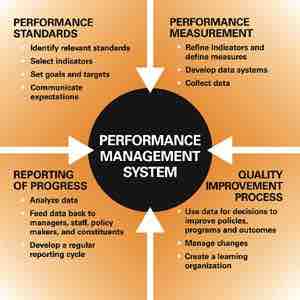A performance appraisal (PA) or performance evaluation is a systematic and periodic process that assesses an individual employee's job performance and productivity, in relation to certain preestablished criteria and organizational objectives. Other aspects of individual employees are considered as well, such as organizational citizenship behavior, accomplishments, potential for future improvement, strengths and weaknesses .

Performance Appraisal
A performance appraisal (PA) or performance evaluation is a systematic and periodic process that assesses an individual employee's job performance and productivity in relation to certain preestablished criteria and organizational objectives.
Three main methods are used to collect PA data: objective production, personnel, and judgmental evaluation. The latter are the most commonly used with a large variety of evaluation methods.
A PA is typically conducted annually. However, the frequency of an evaluation, and policies concerning them, varies widely from workplace to workplace. Sometimes, an evaluation will be given to a new employee when a probationary period lapses, after which they may be conducted on a regular basis (such as every year).
Usually, the employee's supervisor (and frequently, a more senior manager) is responsible for evaluating the employee. A private conference is often scheduled to discuss the evaluation. The interview could function as:
"Providing feedback to employees, counseling and developing employees, and conveying and discussing compensation, job status, or disciplinary decisions".
The process of an evaluation may include one or more of these things:
- An assessment on how well the employee is doing. Sometimes, this may include a scale rating indicating strengths and weaknesses in key areas (e.g., following instructions, promptness, and ability to get along with others). Often, the supervisor and manager will discuss the key areas. Or, as some have dared to expose, employers often don't care about following instructions, arriving on time, or the ability to get along with others.
- Employee goals that are expected to be met (or have made significant progress) by a set time, such as the next evaluation. Sometimes, the employee may voluntarily offer a goal, while at other times it will be set by his boss. A significantly-underperforming employee may be given an performance improvement plan, which details specific goals that must be met to maintain his/her job.
- Sharing of feedback by a worker's fellow employees and supervisors. The employee is given his chance to share his/her feelings, concerns and suggestions about the workplace as well.
- Details about workplace standing, promotions and pay raises. Sometimes, an employee who has performed very well since his last review period may get an increase in pay or be promoted to a more prestigious position. However, a pay raise that is denied is not always the result of a poor review, as economic conditions and other factors dictate the ability for employers to raise their workers' pay.
PA is often included in performance management systems. These systems are used "to manage and align" all of an organization's resources in order to achieve the highest possible performance. How performance is managed in an organization determines to a large extent its success or failure. Therefore, improving PA for everyone should be among the highest priorities of contemporary organizations.